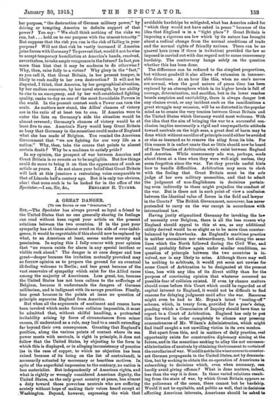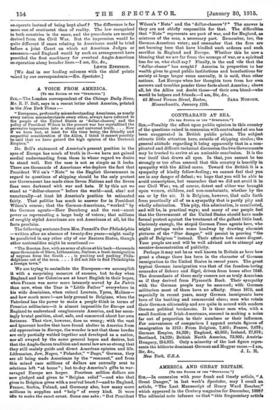A. GREAT DANGER.
[To am Emma or rE, "Srecrwroal
Sra,—The Spectator has always proved so loyal a friend to the United States that no one generally sharing its feelings can read without keen regret your article on the present relations between the two countries. If in the past your sympathy has at times almost erred on the side of over-indul- gence, it would be regrettable if this should now be replaced by what, to an American at least, seems undue severity and pessimism. In saying this I fully concur with your opinion that "no reason exists for alarm in any special incident or visible rock ahead." The danger is at once deeper and lees great—deeper because the irritation mutually provoked may so furrow opinion as to prepare the ground for an eventual ill-feeling welcome to Berlin; and less great because of the vast reservoirs of sympathy which exist for the Allied cause among the majority of Americans. Lees great, too, because the United States has not been callous to the sufferings of Belgium, because it understands the dangers of German militarism, and is indignant with its savage practices. Finally, less great because in the points at issue no question of principle separates England from America.
But when all the arguments of sentiment and reason have been invoked which make future collision impossible, it must he admitted that, without skilful handling, a protracted irritability arising by force of circumstances from minor causes, ill understood as a rule, may lead to a result extending far beyond their own consequence. Granting that England's position, along the various points of contact where its sea power meets with neutrals, is right in principle, it does not follow that the United States, by objecting to the form in which this is displayed, or in alleging inconsistency of practice (as in the case of copper, to which no objection has been raised because of its being on the list of contraband), is necessarily actuated by mercenary or heartless motives. In spite of the superficial impression to the contrary, no nation is less materialist. But independently of American rights, and what is rightly or wrongly considered American dignity, the United States, as the only great country at peace, has almost a duty toward those powerless neutrals who are suffering acutely without, hope of making their voices heard except at ..Washington. Beyond, however, expressing the wish that
avoidable hardships be mitigated, what has America asked for "which they would not have asked in peace " because of the idea that England is in a "tight place " P Great Britain is imposing a rigorous sea law which by its nature has brought about a radical change from the normal conditions of trade and the normal rights of friendly nations. There can be no quarrel here (even if there is irritation) provided the law so imposed is carried out with due regard not to cause unnecessary hardship. The controversy hangs solely on the question, whether this has been done.
The difference can be reduced to the simplest proportions, but without goodwill it also allows of extension in innumee. able directions. At an hoar like this, when no one's nerves are normal, when the good nature of peace time has been replaced by an atmosphere which in its higher levels is full of courage, determination, and sacrifice, but in its lower reaches breeds suspicion and excitability, there is always danger lest any chance event, or any incident such as the ramifications a great struggle may occasion, will be so distorted in the popular mind as to create the very tension between Great Britain and the United States which Germany would most welcome. With the idea that the aim of bringing the war to a successful COD- elusion implies necessarily a rigid and unsympathetic: attitude toward neutrals on the high sees, a great deal of harm may be done which without sacrifice of principle could either be avoided or else so lessened as to remove the sting from its bite. For this reason it is unfortunate that so little should now be heard of those Treaties of Arbitration which exist between England and America. While unnecessary ado was, perhaps, made about them at a time when they were well-nigh useless, they seem forgotten since the war. Yet they provide useful hints how to handle difficulties. Arbitration may seem to clash with the feeling that Great Britain must be the sole judge of her own military necessities, and that to admit the judgment of non-Englishmen in decisions pertain. ing even indirectly to these might prejudice the conduct of the war. But is there not in such point of view a confusion between the identical value of forces in the field and lawyer in the Courts ? The British Government, moreover, has never pretended to carry on the war except in accordance with international law.
Having justly stigmatized Germany for invoking the law of necessity over Belgium, there is all the less reason why England should appeal to this at sea, as any additional utility derived would be so slight as to be more than counter. balanced by its drawbacks. As England's maritime practice is neither anomalous nor extraordinary, but along the same lines which the North followed during the Civil War, and would probably follow again under similar conditions, no question of principle between the two countries is in- volved, nor is any likely to arise. Although there may well be nothing to arbitrate, it would yet seem not unwise for some Court of Arbitration to be designated at the present time, lees with any idea of its direct utility than for the purpose of convincing opinion that whatever occurred no possible fear of collision existed. If even by chance matters ebould come before this Court which could be regarded as of capital interest to England, it would not be difficult to find reasons for delaying judgment until after the war. Recourse might even be had to Mr. Bryan's latest "cooling-off" scheme, which, in treaty form, provided for a year's delay, pending which a Commission of Inquiry should have time to report to a Court of Arbitration. England has only to pot this forward in order completely to silence any pressing remonstrances of Mr. Wilson's Administration, which might find itself caught a not unwilling victim in its own meshes.
But apart from this, and in matters of daily practice, reel opportunity exists for constructive diplomacy aiming at the future, and in the meantime seeking to allay the not unreason- ableirritation of neutrals by obtaining theirconaent to certainof tbe corollaries of war. Would it not be the wiser course to counter- ad German propaganda in the United States, not by denunoia. tion, but by seeking to obtain the co-operation of Americans in subscribing to decisions which, even when necessary, can hardly avoid giving offence ? What is done matters, indeed, less than the way it is done. In those varied relations result- ing from the state of war, by which Great Britain appears as the policeman of the ocean, there cannot but be hardship. Would it not be equitable, and politic as well, that in decisions affecting American interests, Americana should be asked to
co-operate instead of being kept aloof P The difference is far more one of sentiment than of reality. The law recognized in both countries is the same, and the precedents are mostly derived from the Civil War. But the impression would be quite different if cases relating to Americans could be tried before a joint Court on which sat American Judges or assessors—and England would by such en arrangement have provided the first machinery for eventual Anglo-American co-operation along broader lines.—I am, Sir, hr.,
LEWIS EINSTEIN. [We deal in our leading columns with the chief points raised by our correspondents.--ED. Spectator.]



















































 Previous page
Previous page